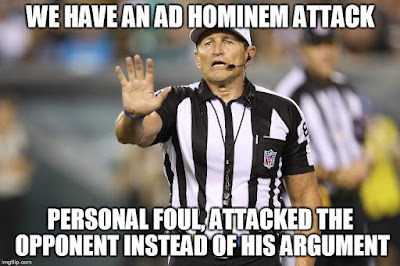In politics logical fallacy is everywhere, for this post I
decided to watch a few debates and it didn’t take long for me to find logical
fallacy. In the debate, moderator
Maria Bartiromo asked Florida ex-Governor Jeb Bush the following:
Bartiromo: Governor Bush, gun rights… What is the harm
in tightening standards for not only who buys guns, but those who sell them?
Bush: I think we need to focus on what the bigger
issue is. It isn't law-abiding gun owners. Look, we have a reduction in gun
violence because in Florida, if you commit a crime with a gun, you're going
away. You're going away for a long, long while. And that's what we should focus
on is the violence in our communities.
Jeb Bush is
claiming that the fact that “youre going away” meaning you will go to prison “for
a long, long while” if you use a gun to commit a crime in flordia caused the
reduction in gun violence in the state he was the former governor of. The word “because”
signals that this a casual claim. However, how do we know that. However, how do we know that the
imprisonment policy is responsible for causing the drop in gun violence? Bush
is not explicit about when this policy was adopted, but presumably it was
adopted before and was in place during at least part of the reduction or it
would be clear that the policy could not be responsible for the reduction. So
for this reason I decided to fact check Mr. Bush’s claim that gun violence went
down in Florida while he governed there. The Washington Post’s fact checker:
Some types of gun violence decreased while
Bush was governor of Florida, but not all. … Overall crime decreased while Bush
was governor of Florida from 1999 to 2007. The downward trend continued after
he left office, and is consistent with crime rates overall in the country. This
is not an exhaustive look at gun violence in Florida, but we crunched the
numbers in three key categories of gun violence to see how they fared between
1999 and 2006…. Murders by firearm were at three per 100,000 in 1999, then four
per 100,000 in 2006. But it increased to 4.4 per 100,000 in 2007…. Aggravated
assaults with firearms and gun robberies went down while Bush was in office.
It appears that gun
violence in Florida during Bush’s term was like a seesaw, some types went up
and some types declined. The
Fact Checker points out, the downward trend in Florida was part of a larger
national reduction in crime. For this reason, it's impossible to know how much
if anything "tough" sentencing policies may have had to do with this
reduction. Plausibility is not enough.











